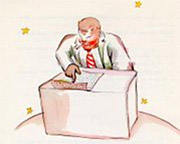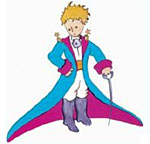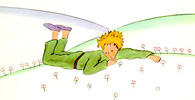The Little Prince
(French Le Petit Prince), published in 1943,
is French aviator Antoine de Saint-Exupéry's
most famous novel, which he wrote while staying
at a hotel in New York.
|

|
|
| The Little Prince, drawn by
Saint-Exupéry himself, chapter II |
The Businessman, chapter 13 |
|
Ostensibly a children's book, it makes several
profound and idealistic points about life and
love. In it, Saint-Exupéry imagines himself
stranded in the Sahara Desert, thousands of
kilometers away from inhabited places, where
he meets a young extra-terrestrial prince. In
their conversations, the author reveals his
own views about the follies of mankind and the
simple truths that people seem to forget as
they grow older. The essence of the book is
contained in the famous line uttered by the
fox to the little prince: "On ne voit bien
qu'avec le cœur, l'essentiel est invisible
pour les yeux" (You only see rightly with
the heart, what matters is invisible to the
eyes). There are also two other main points
in the book, both spoken by the fox. They are:
"You become responsible, forever, for what
you have tamed" and "It is the time
you have wasted for your rose that makes your
rose so important".
Throughout the book the children's view on
the world, on the main points of the human life
and relations between people, which is represented
by the Little Prince and partially by the narrator,
is set off against the "grown-ups"
one, revealed in memories of the narrator and
in the characters, met by the Little Prince
on asteroids. But the author underlines, that
the grown-ups "are like that. One must
not hold it against them. Children should always
show great forbearance toward grown-up people."
The novel includes a number of drawings by Saint-Exupéry
himself, which are reproduced in most versions.
The Little Prince has been translated into many
languages and, to date, has sold more than 50
million copies worldwide and turned into an
anime series that ran 39 episodes. It is often
used as a beginner's book for foreign language
students.
Story
The prince lives on an asteroid, B612, which
has three volcanoes (two active, and one dormant)
and a rose. He spends his days caring for his
asteroid, pulling out the baobab trees that
are constantly trying to take root there. The
trees will rip his little world apart if they
are allowed to grow. The Prince leaves one day
to see what the rest of the universe is like,
and visits several other asteroids each of which
is inhabited by an adult who is foolish in his
own way:
• The King who can "control"
the stars by ordering them to do what they would
anyway. He then relates this to human subjects;
it is the citizen's duty to obey, but only if
the king's demands are good for the citizens.
• The Conceited Man who
wants to be admired by everyone, but lives alone
on his planet. Anything that is not a compliment
he cannot hear.
• The Drunkard who drinks
to forget that he is ashamed of drinking.
• The Businessman who
is always busy counting the stars he believes
he owns. He wants to use them to buy more stars.
The Prince then goes on to define property.
The Prince owns the flower and volcanoes on
his planet because he cares for them and they
care for him. Because one cannot maintain the
stars, he argues, the Businessman cannot own
them.
• The Lamplighter who
lives on an asteroid which rotates once a minute.
Long ago, he was charged with the task of lighting
the lamp at night and extinguishing it in the
morning. At that point, the asteroid revolved
at a reasonable rate, and he had time to rest.
As time went on, the rotation sped up. Refusing
to turn his back on his work, he now lights
and extinguishes the lamp once a minute, getting
no rest. (The prince actually empathizes with
the Lamplighter, who is the only adult to care
about something other than himself.)
• The Geographer who
spends all of his time making maps, but never
leaves his desk to explore, going on the pretext
that it is the job of an explorer to do so.
Even if an explorer were to visit the Geographer,
the Geographer is very doubting of any explorer's
character and would most likely disregard the
report. He doesn't trust things he hasn't seen
with his own eyes, yet will not leave his desk.
Out of professional interest, the geographer
asks the Prince to describe his asteroid. The
prince describes the volcanoes and the rose.
"We don't record flowers", answers
the geographer, because they are only temporary.
The prince is shocked and hurt to learn that
his flower will someday be gone. The geographer
recommends that he visit the Earth.
On the Earth, the prince sees a whole row of
rosebushes, and is downcast because he thought
that his was the only one in the whole universe.
He then meets and tames a fox, who explains
to the prince that his rose is unique and special,
because it is the one that he loves.
The prince meets the narrator and asks him to
draw a sheep. Not knowing how to draw a sheep,
he draws what he knows, a boa with a bulging
stomach, a drawing which previous viewers mistook
for a hat. "No! No!" exclaims the
prince. "I don't want a boa with an elephant
inside! I want a sheep..." He tries a few
sheep drawings, which the prince rejects. Finally
he draws a box, which he explains has the sheep
inside. The prince, who can see the sheep inside
the box just as well as he can see the elephant
in the boa, accepts it.
In the desert, the prince meets a snake that
claims to have the power to return him to his
home planet. After some thought, he bids an
emotional farewell to the narrator, then allows
the snake to bite him. The next morning when
the narrator looks for the prince, he finds
his body has disappeared, leaving no physical
trace.
Astronomy
In 2003, a small asteroid moon, Petit-Prince
(discovered in 1998), was named after the Little
Prince's inspiration, Empress Eugénie's
and Napoleon III's son, Napoleon Eugene, Prince
Imperial.
There is an asteroid called 46610 Bésixdouze,
which is French for "B-six-twelve".
B612 was the name given the asteroid which the
Little Prince lived on. In addition, the asteroid's
number, 46610, is written B612 in hexadecimal
notation.
In addition, asteroid 2578 Saint-Exupéry
was named after the author of The Little Prince.
With a need for holding six digits of information
in five digit fields for the number of real
asteroids, it is now possible to have an actual
asteroid designated similarly to B612: B0612.
The asteroid (110612) 2001 TA142 is listed as
(B0612) 2001 TA142 in the compacted lists that
use A=10, B=11, etc. to extend the existing
five-digit fields in many asteroid software
databases.
The B612 Foundation plans to experimentally
alter the orbit of an asteroid to demonstrate
that the deflection of an Earth-crossing asteroid
is feasible.
References in popular culture
• In the Futurama episode "The Route
of All Evil", the kids Cubert and Dwight
get a space paper route and can be seen delivering
newspapers to The Little Prince in an asteroid
belt.
• Kalan Porter, winner of Canadian Idol,
was nicknamed "The Little Prince"
due to his resemblance to the character.
• In the animated series "The Tick",
villain character Omnipotus, an eater of planets,
is at one point seen devouring the asteroid
The Little Prince inhabits.
• In the classic space adventure game
Star Control II, a constellation is described
as "the snake-like creature who has swallowed
the elephantine beast", a reference to
the elephant-digesting boa constrictor from
the Little Prince.
Adaptations in other media
• A film musical on the subject, titled,
The Little Prince, was made in 1974. This film
is notable chiefly in that it marked the final
collaboration of composer Frederick Loewe and
lyricist Alan Jay Lerner.
• In 1979, Will Vinton Studios produced
a cartoon adaptation of the book. This short
feature, narrated by actor Cliff Robertson,
was one of Vinton's first Claymation productions.
• There was a Japanese based cartoon series
loosely based on the book that aired in Europe
and North America in the 1980s. The show was
made by the Knack animation studio and first
aired in Japan in 1978 under the title "Hoshi
no Ojisama Puchi Puransu" (Prince of the
Stars: Petit Prince). In it, the Little Prince
often traveled to Earth to help people. During
the 1980s, the English-language version was
aired in the United States on Nickelodeon, as
internationally-produced animation often was.
The English version featured Julie Dees (later
voiced by veteran voice actress Katie Leigh)
in the role of the Little Prince.
• A musical in French, "Le Petit
Prince" by well-known French musical composer
Richard Cocciante showed at the Casino de Paris
from October 2002 to January 2003. CD and DVD
recordings are available. Daniel Lavoie played
the Pilot while Jeff played the Little Prince.
• An opera, The Little Prince, based on
the book was composed by Rachel Portman. It
had its stage premiere in 2003 at the Houston
Grand Opera in Houston, Texas. It was broadcast
on BBC2 in the UK on 27 November, 2004 as a
studio-filmed production starring Joseph McManners
as the Prince and Teddy Tahu Rhodes as the Pilot.
• The book was also adapted into a play,
The Little Prince, by Rick Cummins and John
Scoullar.
• In 2005, the book was translated into
Toba, an indigenous language of Argentina, as
So Shiyaxauolec Nta'a. It was the first book
translated into this language since the Bible.
• The book is one of few modern books
to be translated into Latin, as Regulus.
• The actor James Dean was so fond of
the book he actually memorized most of its passages.
• The Smiths' singer Morrissey is seen
holding a copy of the book in his debut solo
video, Suedehead, though his affection for the
novel almost certainly stems from his admiration
of James Dean.
• An Israeli song written by Yehonathan
Gefen, with music by Shem Tov Levy, made the
little prince into a fallen soldier: "The
Little Prince from Comapny B / Will never again
see a sheep eating a flower..." Hebrew
lyrics.
• Anti-Folk singer/pianist Regina Spektor
has a song entitled Baobabs, the entire song
referring to The Little Prince and the affect
it has on its readers.
- Source from Wikipedia

|




